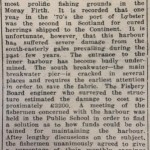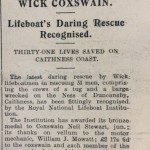The crisis had now arrived in the battle for Stalingrad, as on 14 October the Germans launched another 5-division assault on the north of the city. Suffering heavy losses they pushed forward through the rubble of the city and again in places reached the Volga, but still the Soviets stubbornly held on in isolated pockets. In the Pacific Japanese planes bombed Guadalcanal airfield. Also this week Hitler issued an order that in future any captured British commandos should be executed.
 As several of the schools in Wick had been taken over by the military the children were receiving their education in church and village halls around the town. This brought its own problems, however, as the log book for Pulteneytown Academy shows in an entry dated 14 October: “As the English Church Hall was being used for a sale of work, Miss Keith and her class (Jun. I) were transferred to the Central Church. To prevent too many children being housed in the same building, Jun. I class was taught until 1.30 when the infants were dismissed for the day, a double attendance being marked.”
As several of the schools in Wick had been taken over by the military the children were receiving their education in church and village halls around the town. This brought its own problems, however, as the log book for Pulteneytown Academy shows in an entry dated 14 October: “As the English Church Hall was being used for a sale of work, Miss Keith and her class (Jun. I) were transferred to the Central Church. To prevent too many children being housed in the same building, Jun. I class was taught until 1.30 when the infants were dismissed for the day, a double attendance being marked.”

Children were taught wherever space could be found. Wick North School noted on 12 October: “A new Infant classroom opened today in Miller Street [off Bank Row], thus giving all infants a minimum of three hours instruction, on the average, per day.”
 The John O’Groat Journal reported this week that the recent visit of the Secretary of Scotland to Lybster had revived interest in repairing the harbour, which had been damaged down the years by severe weather: “The entrance to the inner harbour has become badly undermined. The South breakwater – the main breakwater pier – is cracked in several places.” The cost of repairs was estimated at £2,200, but “After lengthy discussions on the subject, the fishermen unanimously agreed to give a percentage of their monthly earnings” towards securing a Treasury grant for the necessary repairs.”
The John O’Groat Journal reported this week that the recent visit of the Secretary of Scotland to Lybster had revived interest in repairing the harbour, which had been damaged down the years by severe weather: “The entrance to the inner harbour has become badly undermined. The South breakwater – the main breakwater pier – is cracked in several places.” The cost of repairs was estimated at £2,200, but “After lengthy discussions on the subject, the fishermen unanimously agreed to give a percentage of their monthly earnings” towards securing a Treasury grant for the necessary repairs.”
Finally this week, the John O’Groat Journal reported that the daring rescue by the crew of Wick lifeboat of 31 men from a tug and barge wrecked on the Ness of Duncansby on 21 September [see Week 161 for details], “has been fittingly recognised by the Royal National Lifeboat Institution. The Institution has awarded its bronze medal to Coxswain Neil Stewart, jun.; its thanks on vellum to the motor mechanic, William J. Mowatt; £2 17s 6d to the coxswain and each member of the crew, and a letter of thanks to Mr John S. Duncan, the hon. Secretary of the station.”
from a tug and barge wrecked on the Ness of Duncansby on 21 September [see Week 161 for details], “has been fittingly recognised by the Royal National Lifeboat Institution. The Institution has awarded its bronze medal to Coxswain Neil Stewart, jun.; its thanks on vellum to the motor mechanic, William J. Mowatt; £2 17s 6d to the coxswain and each member of the crew, and a letter of thanks to Mr John S. Duncan, the hon. Secretary of the station.”
